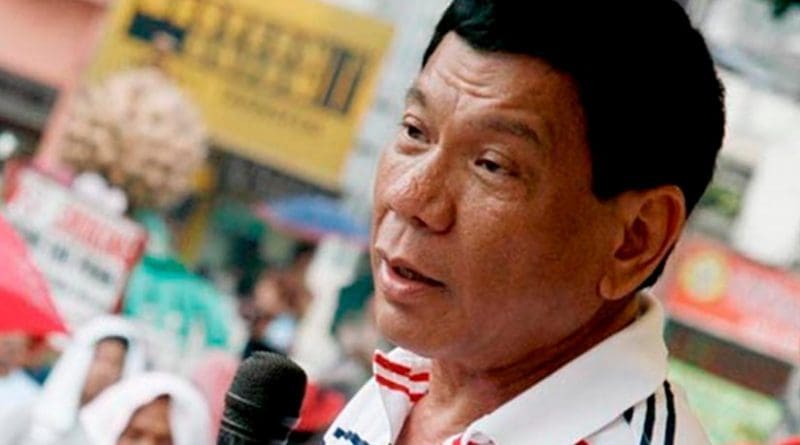Rodrigo Duterte Elected President Of The Philippines – Analysis
On 9 May the Philippines elected Rodrigo Duterte President of Southeast Asia’s oldest democracy. While official results are still to be declared, Duterte has won around 39 percent of the votes and the other candidates have already congratulated him on his victory. To describe Duterte as controversial would be an understatement. His campaign logo was a fist and he enjoys the nicknames of “The Punisher” and “Trump of the Philippines”.
Why did Duterte win and what does the new President stand for? With a population of over 100 million, the Philippines has often struggled to achieve political stability and economic growth. But in the past decade it recorded over 6% growth per year and was among the fastest in Asia’s developing countries. Given this economic success, many observers thought that the administration’s candidate, the widely-experienced Mar Roxas would win. But he was unable to match the folksy rhetoric of Duterte who was able to reach many Filipinos across all ages and socio-economic classes. With his promise of security and a ‘comfortable life’ for Filipinos, Duterte tapped into the widespread feeling of disillusion with the establishment’s failure to eradicate poverty and corruption in the country.
Unlike President Aquino III, Duterte is not a member of the elite families which have run the country for decades and he has managed to use this fact to his advantage. While Aquino is credited for establishing political stability and attracting more foreign investment, Islamist militants, corruption, high unemployment and crime remain serious problems in the Philippines. Duterte is perceived as a man of the people, who offers quick fixes to these problems. It remains to be seen whether an outsider can really govern the country against the wishes of the elite families.
In his time as mayor of Davao in the southern Philippines island of Mindanao death squads killed more than a thousand alleged criminals. He has not only openly confirmed his association with these death squads, but also announced that his presidency “will be a bloody one” as far as tackling crime is concerned. He also came in for widespread condemnation for his defamation of an Australian, who was raped and murdered in Davao in 1989: “she was so beautiful, the mayor should have been first. What a waste.”
Describing himself as “a man of many flaws and contradictions”, Duterte cried at the tomb of his parents after the election stating he was “just a nobody” and promised to behave during his presidency. While his loose mouth has aided his profile as an ordinary man, his campaign, like that of Donald Trump, has been short on specific policies.
Besides cracking down on crime, Duterte intends to introduce a federal mode of government, arguing that Manila is getting too much of the national pie.
Duterte was quick to provide first details on his cabinet. Former military officers will feature in the “lower echelons” of administration and selected old friends, including former classmates, get to be top-level advisors. Members of Duterte’s fraternity, Lex Talionis, are considered as candidates for the Justice department.
International observers are keen to see how Duterte will shape the Philippines external relations with China, particularly in the South China Sea. He has talked of opening bilateral talks with China while at the same time calling for a multilateral approach to resolve disputes. It is not clear how he will respond to the imminent judgement of the Permanent Court of Arbitration in The Hague on the South China Sea. The ruling could come out before Duterte takes office on 30 June.
Another important issue will be relations with ASEAN as the Philippines takes over as its chair in 2017. Maintaining a semblance of ASEAN unity in the face of challenges from China will be a major task. The Philippines also stands to benefit from deeper economic integration through the ASEAN Economic Community. It is also crucial for the new president to continue to find a political solution to the festering secessionist problem in the southern Mindanao provinces while working with countries in the region and beyond to fight terrorism and other transnational challenges and appreciate the value of regional cooperation in preventing conflict and dealing with security threats. The EU will be watching these developments closely as it seeks to deepen relations both with the Philippines and ASEAN.


Now that all have been said and done, we go down to brass-tacks. The newly elected Pres. Dugong Duderte has promised Heaven for the Filipino Nation. I hope we don’t go to Purgatory instead of Hell.